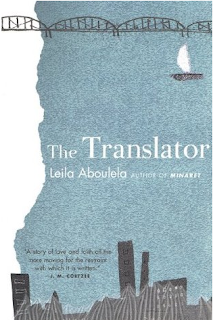The Translator
THE TRANSLATOR
by Leila Aboulela
Nomination: Orange Longlist 2000
Date Read: October 14, 2021
In The Translator, Aboulela captures the various incarnations of grief in realistic and tangible ways. Sammar is caught between two worlds – Sudan, her country of birth and home to her faith and language, and Scotland, her country of loss and isolation and an almost encounter with love.
Sammar is a translator at a Scottish university, translating various texts from Arabic into English. Having lost her husband, Tariq to a tragic car accident, she was incapable of raising her son on her own. She returned to Sudan with her husband in a coffin and placed her son in the care of her husband’s family. When she set out to bring her boys home, she didn’t believe she would return to Scotland but the heartbreak she absorbed from Tariq’s family’s grief was too much to bear. She returned to Scotland alone.
And alone she remained, living in Scotland like a woman trapped in stasis – doing the minimum to survive, keeping her apartment a sterile and cold place, living in black and white. When her boss, Rae, requests she translate a difficult text, they begin to see something familiar and comfortable in one another. Over the holidays, they enjoy long conversations in the middle of the day and deep in the night. Slowly and inevitably, they fall in love.
The one thing that has kept Sammar sane through all of her grief and isolation is her faith. She is a devout Muslim, praying five times a day and finding comfort in the Qur’an. Rae has scholarly knowledge of Islam but is unsure whether he personally believes in Allah, thus trapping Sammar in two states of being. While she knows they can never be together because her faith is too important to her, she is also blooming – decorating her home, buying new clothes, taking the steps necessary to actually live her life deliberately instead of each day washing over her like Novocain.
Rae helps Sammar find a temporary translation job in Cairo, from which she can return to Khartoum to visit her family. She hasn’t been back since she returned her dead husband and much alive son. Just before she is scheduled to leave, Rae and Sammar have a devastating conversation where a vicious side of Sammar emerges and Rae curls into himself and tells her to essentially leave him alone. She takes this to heart and leaves for her trip a day early.
The sites and sounds and smells of Khartoum permeate the remainder of the book. Aboulela’s descriptions of Khartoum reveal its beauty and hideousness – abject poverty while surrounded by love, constant power outages but a miraculous sky, the smell of garbage on the street but the scents of jasmine and eucalyptus. Aboulela’s ability to describe these two worlds existing simultaneously is brilliant.
While I was sure Sammar would never see Rae again (what are the odds he would ever be willing to convert?), Aboulela surprises us again with a letter from a mutual colleague stating that Rae has taken an oath to Allah and has indeed converted. After they are reunited, it is as if no time has passed between them and they speak of their future marriage as an inevitability.
I loved this novel for so many reasons but mostly because no one should ever consider their life over. Humans are never too old for love or for happiness. This is, after all, why we are here.




Comments
Post a Comment